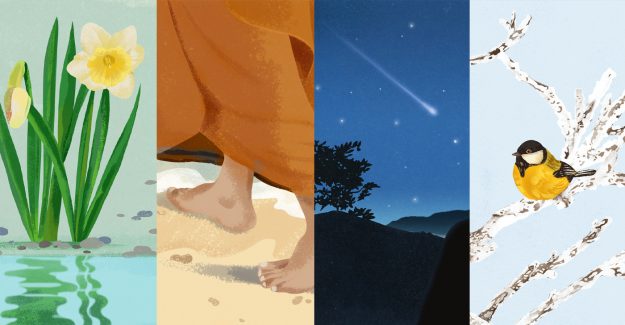
At seventeen syllables, haiku is the shortest poem in world literature. It is now also the most popular form of poetry in the world, written in nearly every language. And yet, as haiku has spread internationally, one of the most important aspects of the tradition has largely been lost—the community of poets.
In Europe and the United States, haiku is often regarded as the domain of literary elites, but this is not the case in Japan, where haiku is deeply rooted in communal activity. Millions of amateur Japanese poets belong to haiku groups (clubs, really), which are sponsored by different “schools” of haiku, each with its own magazine. Most daily and weekly newspapers carry a haiku column featuring poems submitted by their subscribers, sometimes on the front page.
To help bring back this social dimension, we are inviting our readers to participate in the monthly Tricycle Haiku Challenge. Each month, moderator Clark Strand will select three poems to be published online, one of which will appear with a brief commentary. Each quarter, one of these poems also will appear in the print magazine alongside an extended commentary. In this way, we can begin to follow the seasons together—spring, summer, fall, and winter—and share the joy of haiku together as a community.
Requirements:
Anyone can submit haiku to the monthly challenge using the form below. To be considered for publication, your haiku must:
- Be written in three lines of 5, 7, and 5 syllables:
Getting the syllables of a haiku to sit naturally inside of its seventeen-syllable form is the primary challenge. Each haiku is a word problem in search of a satisfying seventeen-syllable solution. - Contain the “season word” assigned for that month:
A haiku isn’t only a word problem. To the seventeen syllables the poet must add a turn of thought that results in more than seventeen syllables of meaning—along with a word that refers to one of the four seasons. How the poet uses “season words” like autumn sun or dew will typically determine the effectiveness of the poem.
Part of the reason haiku appeals to so many people is that its rules are simple and easy to follow, yet it can take a lifetime to master them. Ten million people currently write haiku in Japanese. There is no reason why millions can’t write haiku in English, too, provided they agree on the basics. The turn of thought you add to that simple formula of 5-7-5 syllables with a season word is entirely up to you.
Submissions close on the last day of the month at 11:59 pm ET, and the results will be posted the week after. Monthly submissions are anonymized and the winning poems are selected in a blind process.
To learn more about the history and principles of haiku, check out Clark Strand’s online course with Tricycle, “Learn to Write Haiku: Mastering the Ancient Art of Serious Play.”
This Month’s Season Word:
Submit as many haiku as you please using the submission form below. Just be sure to include this month’s season word.
Winter season word: “Winter Star”
one learns to explode
inwardly and silently
like a winter star
I felt overwhelmed after reading the news, so I stepped outside to look at the sky. The winter stars had figured it out. They could explode without flying apart. — Clark Strand
Submit as many haiku as you please on the season word “winter star.” Your poems must be written in three lines of 5, 7, and 5 syllables, respectively, and should focus on a single moment of time happening now.
Be straightforward in your description and try to limit your subject matter. Haiku are nearly always better when they don’t have too many ideas or images. So make your focus the season word* and try to stay close to that.
*REMEMBER: To qualify for the challenge, your haiku must be written in 5-7-5 syllables and include the words “winter star.”
Haiku Tip: Write with Feeling!
How much emotion is allowable in a haiku? The short answer is “as much as you can get away with.” The trick is knowing who it is for.
Strictly speaking, a haiku no longer belongs to the poet once it has been sent out into the world. This is true of all poetry to some extent. But it is more true of haiku. A haiku lives in the thoughts and feelings that unfold from the bare little squiggle of a poem. What the poet provides is 17 syllables only. What the reader experiences is a world.
That being the case, the poet’s job is to write with feeling while not getting in the way of those feelings . . . to suggest a world while not getting in the way of that world. Therefore, most of what the poet puts into a haiku will be suggested, not stated.
So how do we write with feeling? Over the centuries, poets have offered advice on writing from the heart. Bashō believed it was important to leave room for the reader to intuit the heart of the poem. Shiki said the emotional content should be expressed through objective images. And Issa confessed everything, telling the truth about his life no matter what. But everyone agrees on one thing: a haiku isn’t a haiku without some emotional truth at the heart of it. This is what poets always strive for, even if they get there in different ways.
A note on winter stars: Season word editor Becka Chester writes about this month’s theme: “In winter months, in the northern hemisphere, our view is past the periphery of the Milky Way, with far fewer stellar bodies between earth and extragalactic space. The air is drier at night in winter, so there is less haze in the atmosphere. The stars are bright and intensely clear.
“In Haiku World, William J. Higginson writes of winter stars, ‘The clarity and chill of winter skies bring the stars closer.’ During this season, deciduous trees are bare of foliage, so we have a less impaired glimpse of the sky. And because the nights are longer, we have ample opportunities to gaze up at the stars.”
December’s Winning Poem:
Winter season word: “Winter Solstice”
the amount of work
during the winter solstice
remaining the same
— Marie Derly

You can find the honorable mentions, additional commentary, and December’s haiku tips here.
Previous Winners
|
2021 |
2022 |
2023 |
|
2024 |
2025 |
♦
